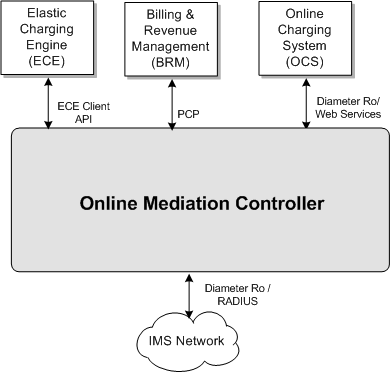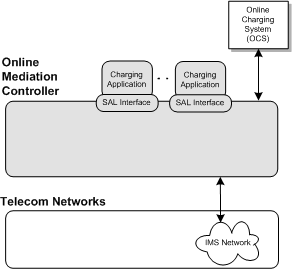| Oracle® Communications Service Broker Online Mediation Controller Implementation Guide Release 6.1 E29452-02 |
|
|
PDF · Mobi · ePub |
| Oracle® Communications Service Broker Online Mediation Controller Implementation Guide Release 6.1 E29452-02 |
|
|
PDF · Mobi · ePub |
This chapter provides an overview of the Oracle Communications Online Mediation Controller.
Before you read this chapter, you should be familiar with Oracle Communications Service Broker concepts and architecture. See Oracle Communications Service Broker Concepts Guide, for more information.
Online Mediation Controller acts as a single interface for online charging systems (OCSs) to the IMS network, mediating Diameter and RADIUS protocol messages to the OCS for rating, authentication, and authorization.
Online Mediation Controller provides network mediation for Oracle Communications Billing and Revenue Management (BRM), Oracle Communications Elastic Charging Engine (ECE) and third party OCSs. Online Mediation Controller supports concurrent connections to more than one OCS in the same domain, allowing mediation of messages to different OCSs.
When integrated with third party OCSs, Online Mediation Controller communicates through either a Diameter Ro interface, if supported, or a Web Services (HTTP, SOAP) interface. Integrations with BRM use the Portal Communications Protocol (PCP) for communication. When integrated with ECE, Online Mediation Controller mediates network charging requests using the ECE client API.
The integrations to the different OCS options are shown in Figure 1-1.
Figure 1-1 Online Charging Service Delivery to the Network

Online Mediation Controller also extends the OCS functionality traditionally associated with balance management and rating, with additional charging reliant features. In Degraded and Offline modes, Online Mediation Controller functions as one or more local online charging systems to handle requests when the external OCS is either unavailable or under excessive load.
In Degraded Mode, Online Mediation Controller handles charging requests when the OCS is unavailable. See "Degraded Mode" for more information.
In Offline Mode, Online Mediation Controller can service charging requests from low risk users and record usage for replay to the external OCS during off peak hours. See "Offloading Safe Subscriber Requests" for more information.
The following sections introduce key concepts and features of the Service Broker Online Mediation Controller.
Online Mediation Controller provides a Session Abstraction Layer (SAL) interface that you use to implement applications that extend your OCS functionality.
Applications that you implement reside on the session path inside Online Mediation Controller, optionally orchestrated and invoked with other external applications, and active during session setup and execution.
Applications can use any session parameter such as called party, call duration and charging information, to run their business logic, and affect session setup and execution synchronously. For example, an application can play an announcement when the subscriber balance goes down below a threshold, asking the subscriber to top up his account.
Applications can also invoke additional asynchronous activities in your system, by publishing events to external entities through a Web services API. For example, an application can notify your Operational Support Systems (OSS) when a subscriber tops up his account. The session itself is not affected by the notification, but your OSS can trigger asynchronous activities such as sending a notification email to the subscriber.
See Oracle Communications Service Broker Configuration and Runtime MBean Java API Reference, for more information about the SAL interface.
Figure 1-2 shows applications implemented inside a Online Mediation Controller domain, that you combine, using service orchestration logic, with online charging services provided by the OCS.
Figure 1-2 Complementary Charging Applications

You can control service delivery for subscribers, specifying which applications to invoke and in what order, by basing orchestration logic conditions on the subscriber state, service type, geographical location and other charging request attributes, such as usage counters, stored in the Online Mediation Controller Subscriber Store.
You extend the subscriber lifecycle by defining the subscriber states your implementation requires. Each state implies a certain set of privileges and prohibitions. For example, you can configure Online Mediation Controller to charge Active subscribers, or redirect Suspended subscribers to top up their accounts. You can also publish and consume state transition notifications and actively request state transitions.
Online Mediation Controller provides two possible repositories for use as the Subscriber Store:
Local Subscriber Store - Online Mediation Controller stores and updates subscriber profile data in a locally configured Oracle Berkeley or Oracle Enterprise 11g Database configured during domain creation. See Oracle Communications Service Broker Subscriber Store User's Guide, for more information on the Local Subscriber Store.
BRM-based Subscriber Store - Online Mediation Controller uses subscriber profile data sourced from the BRM database. See "Configuring the Subscriber Store", for more information on the BRM Subscriber Store.
Complementary applications use the Event Notification Framework to publish events. The type of event and its timing are application-specific.
Events can be targeted to internal Online Mediation Controller components, or to external systems, such as your OSS. External systems use an asynchronous Web services Event Notification API to consume these events.
Using the Event Notification Framework, Online Mediation Controller can be integrated with external Business Intelligence (BI) systems, basing business logic on complementary application events. For example, BRM may fire an event when a subscriber reaches a predefined monthly usage threshold to update the subscriber's profile, driving further business logic on the OSS side such as data throttling.
OSS applications consuming Online Mediation Controller events may also use those events as triggers to change Online Mediation Controller behavior. OSS applications make changes to Online Mediation Controller using Web services APIs. For example, if an OSS application consumes an event noting that a subscriber has reached a predefined monthly credit threshold, then the OSS application can use the Subscriber Provisioning Web services API to suspend the subscriber account.
Figure 1-3 shows how complementary applications use the Event Notification API to publish events to external systems.
The Event Notification Framework is thereby a Online Mediation Controller extension point in which you can extend business logic, and link online activities related to charging and service delivery with other activities happening in your OSS.
Degraded Mode is activated when the OCS cannot respond to charging requests directed at it from Online Mediation Controller. This may happen when the OCS fails or during an OCS maintenance window.
Degraded Mode guarantees service continuity while the OCS is unavailable. During that time, Online Mediation Controller ensures service continuity by responding to charging requests and generating and storing call data records (CDRs) for subscriber activity.
When the OCS resumes processing, Online Mediation Controller forwards the CDRs to the OCS which rates and updates subscriber account balances accordingly.
See "Using Degraded Mode", for more information.
Online Mediation Controller can offload charging requests from the external OCS based on session attributes such as service ID, location, or resource counter value. Online Mediation Controller, acting as a local OCS, answers the qualifying requests with a preconfigured response and generates CDRs for each session. CDRs are stored for playback to the external OCS during off-peak time periods.
Offloaded generated CDRs from the same subscriber can also be compressed before playback for efficiency.
Using Offline Mode allows service providers to optimize OCS utilization and reduce the possibility of OCS failure due to overloading.
See "Offloading Subscriber Usage", for more information.
Online Mediation Controller contains a configurable, built-in overload protection mechanism preventing failures due to excessive request load.
See "Implementing Overload Protection", for more information.
Online Mediation Controller contains a configurable Redirection application that redirects subscriber sessions based on low or empty resource responses received from an online charging system. For example, the Redirection application sends sessions with expiring resources to the Announcement Player application, notifying the subscriber of their remaining balance.
See "Redirecting Sessions", for more information.
You use the User Interaction Framework to contact subscribers with charging-related information. Online Mediation Controller supports these channels for user interaction:
Short Message Service (SMS): You can send SMS messages to subscribers using the Short Message Peer to Peer (SMPP) protocol. For example, you can send an SMS message to a subscriber when his account is being activated, after he uses a service for the first time.
Announcements: You can use the User Interaction Framework to play mid-call announcements to either the calling party or called party.
You can monitor Online Mediation Controller using a collection of runtime MBeans. Online Mediation monitors provide information on the performance of processing modules, request orchestration and connected network entities.
See "Monitoring Online Mediation Controller", for more information about monitoring Online Mediation Controller.